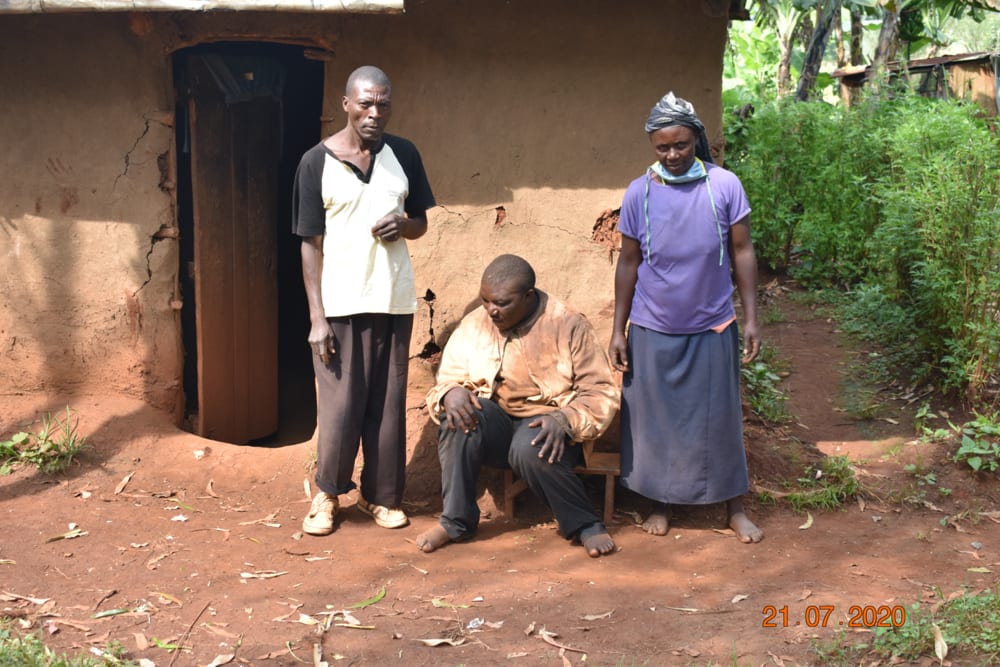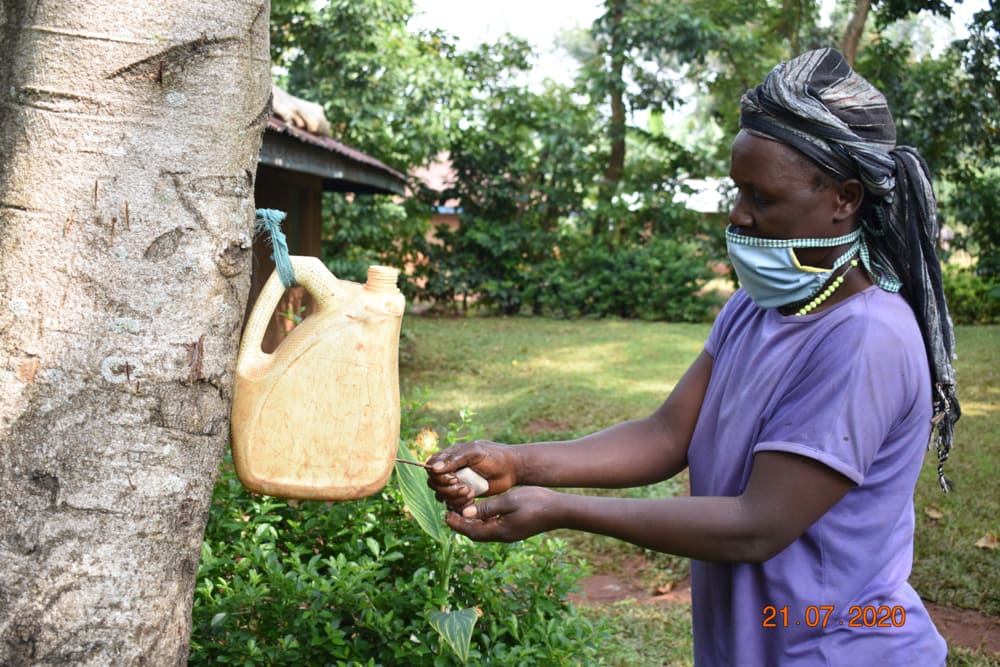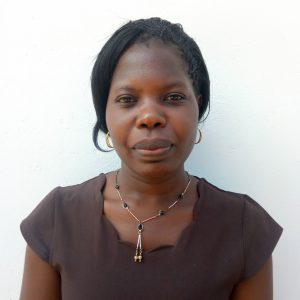Project Updates
July, 2020: Through Their Eyes: COVID-19 Chronicles with Everlyne Muruli
This post is part of a new series by The Water Project meant to highlight the perspectives and experiences of the people we serve and how the COVID-19 pandemic is impacting them. We invite you to read more of their stories here.
Everlyne Muruli is a 48-year-old farmer and mother who lives in Emulembo and relies on Gideon Spring for her daily water needs. An active member of the spring's water user committee, Everlyne also serves as the group's treasurer.

Everlyne Muruli shows her mask outside her home in Emulembo.
Our team recently visited Emulembo to conduct a COVID-19 prevention training (read more about it below!) and monitor their water point. Shortly after, we returned to check in on the community, offer a COVID-19 refresher training, and ask how the pandemic is affecting their lives.
It was during this most recent visit that Everlyne shared her story of how the coronavirus has impacted her life.
Team member David Muthama met Everlyne outside her home to conduct the interview. Both David and Everlyne observed social distancing and other precautions throughout the visit to ensure their health and safety. Their questions and answers have been edited for clarity and length.

Everlyne raises her hand to pose a question during the COVID-19 refresher training.
What is one thing that has changed in your community since the protection of Gideon Spring?
"The sicknesses that we used to complain about are no longer there, and we have realized most of them were water-related diseases. This has helped the community know the importance of having clean, safe water because since the protection of the spring, no cases [of water-related diseases] have been reported evidently in my family."

Everlyne fetches water from Gideon Spring.
How has having a clean water point helped you through the pandemic so far?
"I am happy because the spring is protected and washing my hands with clean water, I know I will not catch the virus because the water is clean and safe. Again, any time I come back from outside the home I wash my hands and also after touching items here and there. The water is also safe for drinking."

Community members observe social distancing while lining up to fetch water at Gideon Spring (Everlyne is at the discharge pipe).
Since the outbreak of COVID-19 in Kenya, has fetching water changed for you because of restrictions, new rules, or your concerns about the virus?
"Yes, things have changed a lot because we are very many who use the spring so I just fetch water and leave; no more chatting with other users because crowds are not allowed. I also must wear my mask to the spring to avoid contamination."

Everlyne demonstrates putting on her mask without touching her face, the way she learned at training.
How has COVID-19 impacted your family?
"As for me and my activities, I have not been badly affected since most of my life I have depended on farming. I still go to my farm and take care of my animals and crops. But as for my family, my husband and children have been affected. My husband no longer goes to work and the studies of my children have been affected [since schools closed in March]; they are just idling at home."

Everlyne with her husband and son at home.
What other challenges are you experiencing due to the COVID-19 pandemic?
"The prolonged stay by the children at home is getting very expensive economically, and since they are idle I am worried for their safety."
What hygiene and sanitation steps have you and your community taken to stop the spread of the virus?
"It has become a rule every homestead should have a handwashing station. When you enter someone's compound, you have to wash your hands with soap, and also after leaving the place you wash your hands. The chief and local administration are really strict about social gatherings and wearing of masks in public places."

Everlyne lathers up her hands with soap to wash her hands at home.
What restriction are you looking forward to being lifted?
"The social gatherings ban, because I am a singer and we can no longer meet for choir practices. Even if we get the chance, due to social distancing, the music does not make much sense."
When asked where she he receives information about COVID-19, Everlyne listed the radio, word of mouth, and our team's sensitization training.

Everlyne washes her hands with water from Gideon Spring using the leaky tin handwashing station she set up outside her home.
What has been the most valuable part of the COVID-19 sensitization training you received from our team?
"When you emphasized on the point that washing hands with soap helps keep Corona away, we have adhered to that. It works - so far no one has been harmed by Corona around here."

May, 2020: COVID-19 Prevention Training Update at Emulembo Community, Gideon Spring
Our teams are working on the frontlines of the COVID-19 pandemic. Join us in our fight against the virus while maintaining access to clean, reliable water.

Staff in masks and gloves while practicing social distancing and leading training
We are carrying out awareness and prevention trainings on the virus in every community we serve. Very often, our teams are the first (and only) to bring news and information of the virus to rural communities like Emulembo, Kenya.

A woman listens to training wearing her homemade mask
We trained more than 10 people on the symptoms, transmission routes, and prevention of COVID-19. Due to public gathering concerns, we worked with trusted community leaders to gather a select group of community members who would then relay the information learned to the rest of their family and friends.

Team Leader Emmah in action with full personal protective gear
We covered essential hygiene lessons:
- Demonstrations on how to build a simple handwashing station
- Proper handwashing technique
- The importance of using soap and clean water for handwashing
- Cleaning and disinfecting commonly touched surfaces including at the water point.

Trainer Protus helps make the new leaky tin for the spring
We covered COVID-19-specific guidance in line with national and international standards:
- Information on the symptoms and transmission routes of COVID-19
- What social distancing is and how to practice it
- How to cough into an elbow
- Alternative ways to greet people without handshakes, fist bumps, etc.
- How to make and properly wear a facemask.

Trainer Protus leads handwashing demonstration
During training, we installed a new handwashing station with soap near the community’s water point. Due to the rampant spread of misinformation about COVID-19, we also dedicated time to a question and answer session to help debunk rumors about the disease and provide extra information where needed.

A community member washes her hands
We continue to stay in touch with this community as the pandemic progresses. We want to ensure their water point remains functional and their community stays informed about the virus.

Handwashing
Water access, sanitation, and hygiene are at the crux of disease prevention. You can directly support our work on the frontlines of COVID-19 prevention in all of the communities we serve while maintaining their access to safe, clean, and reliable water.

January, 2020: Emulembo Community, Gideon Spring Project Complete!
Emulembo Community now has access to clean water! Gideon Spring has been transformed into a flowing source of water thanks to your donation. We protected the spring, provided 5 sanitation platforms to different households in the community, and we trained the community on improved sanitation and hygiene practices.

Children of Emumbo enjoying the water at Gideon Spring
Spring Protection
Community members provided all locally available construction materials, including bricks, wheelbarrows of clean sand, stones, and fencing poles. Accommodations and meals were provided for the artisan, too.
Mr. Hendi Anyika, an older farmer who helped organize training and who would be elected Chair of the water committee, helped mobilize his community members by blowing his whistle as he went from homestead to homestead, asking folks to help collect and deliver stones and other building materials to the construction site. The whistle of elders is a common organizing tool in this area, so people know to take action when they hear it.

Community membres delivering stones to the construction site
The Process
Women and men lent their strength to the artisan to help him with manual labor. The spring area was excavated to create space for setting the foundation of thick plastic tarp, wire mesh, and concrete. After the base had been set, both wing walls and the headwall were set in place using brickwork. The discharge pipe was fixed low in place through the headwall to direct the water from the reservoir to the drawing area.

Field Officer Elvin confirming accurate measurements of the discharge pipe
As the wing walls and headwall were curing, the stairs were set and ceramic tiles were fixed directly below the discharge pipe. The tiles help protect the concrete from the erosive force of the falling water and beautifies the spring. Because the path to access Gideon Spring is downstream and very steep, Mr. Anyika brought the community together and they agreed to contribute money to extend the staircase further than the original plan to make it much easier to access their spring.

Extending the stairs to Gideon Spring
The process of plastering the headwall and wing walls on both sides reinforces the brickwork and prevents water from the reservoir from seeping through the walls and allows pressure to build in the collection box to push water up through the discharge pipe.
The source area was filled up with clean stones and sand and covered with a thick plastic tarp to prevent potential sources of contamination. It took about 2 weeks of patience for the concrete to dry.

Field Officer Elvin helps the artisan and community members plant grass at the spring site
As soon as it was ready, people got the okay from our field officers to begin fetching clean water. We met them there to celebrate this momentous occasion.
"Our children will no longer know the pain of typhoid since in every village around here with unprotected springs, people suffer from typhoid constantly. We did know the cause in our village, but there were no other sources of clean or safe water. But now, everything is going to be okay," said Mr. Anyika.

The official handing over of Gideon Spring to the Emumbo Community, with Field Officer Elvin on right
Sanitation Platforms
All 5 sanitation platforms have been installed. These 5 families are happy about this milestone of having a private latrine of their own and are optimistic that people will no longer leave waste outdoors. We are continuing to encourage families to finish building walls and roofs over their new latrine floors.
“I feel blessed that I will not have to bother my neighbors by sharing a latrine with them anymore,” said Mama Marystella Musundi, whose family previously had to go to the next compound to ask to share their latrine.
Other times, when the 2 families were not on good terms, Mama Musundi's family would have to resort to open defecation, but now this will be a burden of the past.

Proud new owners of a sanitation platform
New Knowledge
Mr. Anyika was tasked with organizing the training, so he spread the word as he was going to each house blowing his whistle during the materials collection phase of spring construction. Mr. Anyika gave us the community’s preferred date for training, for he was very much aware of the community calendar when it comes to planting season and other big events. We ended up doing the official handing over ceremony on the morning of training, so everyone came to the event in very high spirits as the mood had already been set.
36 people attended training, 2 thirds of whom were women. We held the training outside as "the day was sunny, but thanks to Mama Africa the meeting point had trees that gave beautiful shade for conducive learning," said Field Officer David Muthama.
Everybody was interested since we explained that there would be an election to choose the water committee leaders "and oh my, this community really loves politics so this made the members present and excited" recalled David.

Group discussion activity during training
We covered several topics including leadership and governance; operation and maintenance of the spring; healthcare; family planning; immunizations; and the prevention and spread of disease. We also covered water treatment methods, personal care like handwashing, environmental hygiene, hygiene promotion, and many other things.
The primary healthcare session led by Facilitator Miss Lynah Akuku was particularly lively, as participants were quick to answer, correct, and joke with one another throughout the session as they interacted with Lynah. Next up was environmental hygiene, which was encouraging since most of the women in this community were well-educated and enthusiastic about taking care of their environment. Most women had already constructed clotheslines, and a majority of the homesteads had dishracks.
One community member, Jackline, found herself put on the spot when she said she airs her laundry on the grass, but the facilitator Miss Lynah explained the dangers and risks of the practice, such as poisonous worms attaching themselves to the cloth which can then harm you once you get dressed. Jackline promised to construct a clothesline directly following the training.

Handwashing session
Reflecting on the dental hygiene session, teenager and student Petronilla shared her thoughts on what she learned.
"This training has enabled me to get the correct procedure of how to take good care of my teeth. Using your demonstrations I have now seen how to do it properly. I used to think you could brush your teeth any which way and in any direction but now I have learned otherwise," she said.

A volunteer demonstrates proper toothbrushing during dental hygiene session
The training was so smooth and fun, and everyone was happy throughout the day. One factor adding to this was the presence of the Community Administrator from the County Government, who stayed throughout the training session and even had a small talk with his community.
With the election of the water committee leadership, the training came to an exciting close. The community members said they have really benefited from the training and that they would now be at peace after selecting leaders that will protect the interest of their spring. With many of them putting in a lot of effort to see the project come to fruition, all they wanted was to have their energy never go to waste and with this, they were hungry for good leaders that the majority already had in mind. Among the other elected members, this resulted in the election of Mr. Anyika to the position of Chair.
Thank you for making all of this possible!

December, 2019: Emulembo Community, Gideon Spring Project Underway!
Dirty water from Gideon Spring is making people in Emulembo sick. Thanks to your generosity, we’re working to install a clean water point and much more.
Get to know this community through the narrative and pictures we’ve posted, and read about this water, sanitation and hygiene project. We look forward to reaching out with news of success!

August, 2019: Going with the Flow
We stand behind our commitment to help provide communities with access to clean, safe, and reliable water. That's why when we conducted our follow-up visits to Wanyonyi Spring in Kisembe Community to continue vetting the spring's potential for protection, we realized it was no longer a suitable candidate. Kenya endured one of the driest seasons on record this year, and in the intense drought we found that Wanyonyi Spring was no longer viable - the water had dried up.
Without enough water to guarantee a year-round source, we worked with the community to determine the next best solution for their water stress. They requested a chorine dispenser to help treat the water when it returned, and we were able to connect them with a local organization that will help install the dispenser and provide training on its use.
With these changes in focus, we redirected our efforts to Gideon Spring in Emumbo Community, where we have successfully determined the spring is viable year-round and is a good candidate for protection. We will continue to grow our relationship with Kisemebe Community, however, as we work with them to find a different, reliable water source in the area.


 Protected Spring
Protected Spring
 Rehabilitation Project
Rehabilitation Project


















































